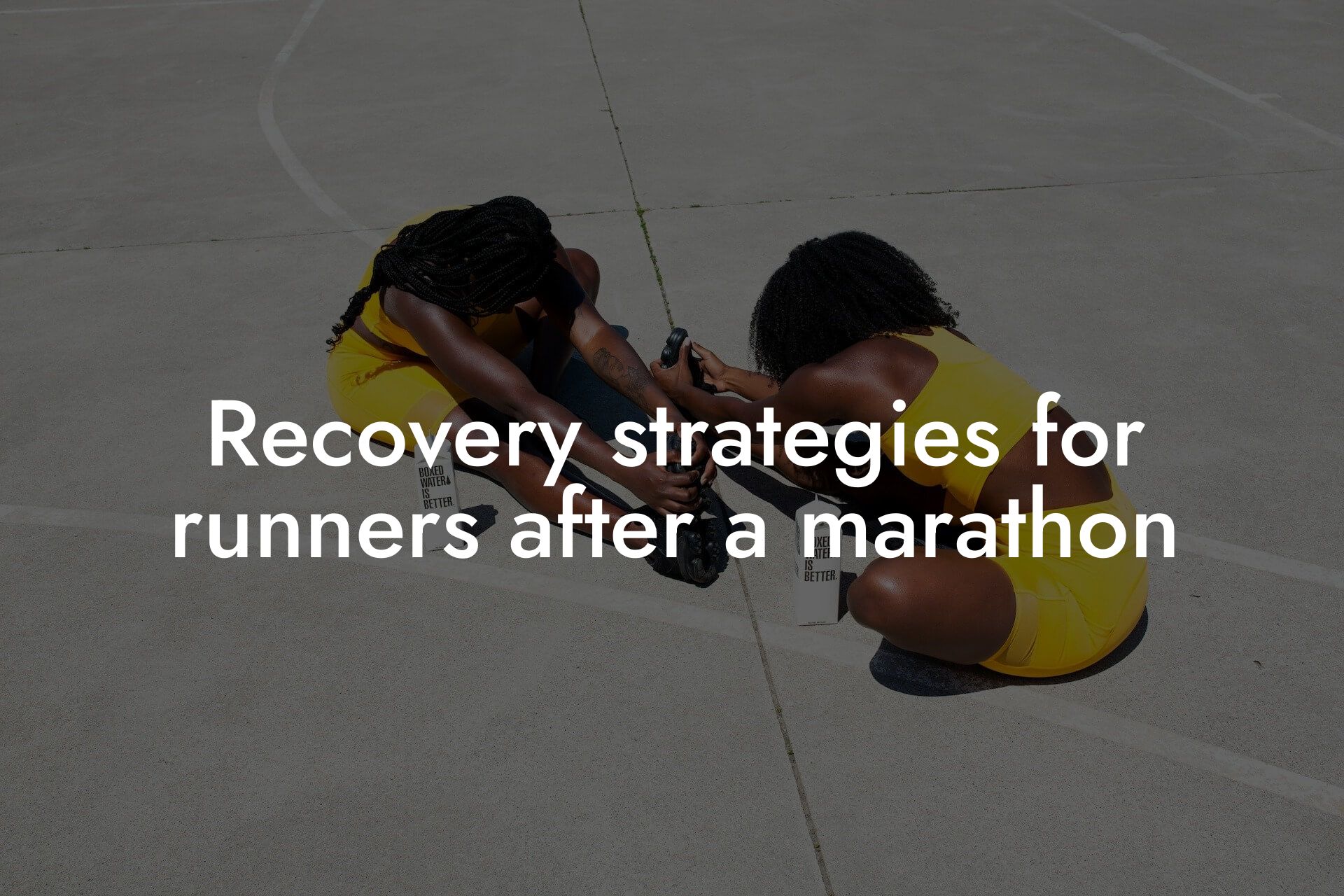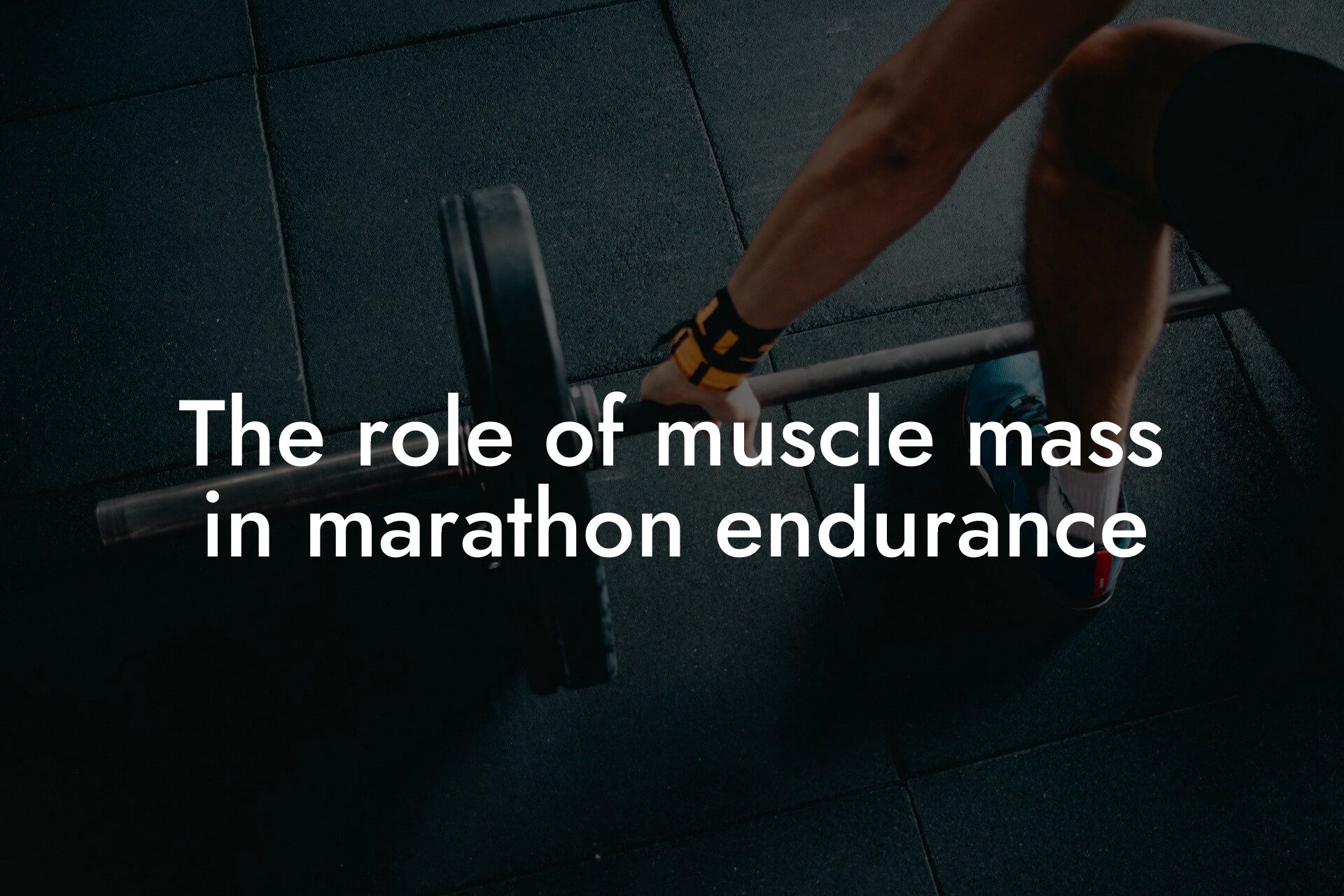As a high-earning professional, you understand the importance of taking care of your physical appearance and overall health. At Tano Performance Group, we're committed to providing you with the information and tools you need to optimize your body composition and reach your fitness goals. Whether you're a seasoned marathon runner or a beginner, proper hydration and nutrition are crucial for a successful and enjoyable marathon experience. In this article, we'll provide you with expert tips and advice to help you prepare for marathon day.
Table of Contents
- Understanding Your Hydration Needs
- Electrolytes: The Key to Optimal Hydration
- Fueling Your Body for Optimal Performance
- Carb Loading: A Marathon Runner's Best Friend
- Hydration and Nutrition Timing: When to Fuel and Hydrate
- During the Race: Hydration and Nutrition Strategies
- Avoiding Common Mistakes: Hydration and Nutrition Don'ts
- Post-Marathon Recovery: Hydration and Nutrition Strategies
- Frequently Asked Questions
Understanding Your Hydration Needs
Proper hydration is essential for optimal athletic performance. When you exercise, you lose water and electrolytes through sweat, which can lead to dehydration if not replenished. Dehydration can cause a range of symptoms, from mild headaches and fatigue to severe heat stroke and even organ failure. As a marathon runner, it's essential to understand your individual hydration needs to avoid dehydration and optimize your performance.
To calculate your sweat rate, weigh yourself before and after a typical training run. The difference in weight represents the amount of fluid you've lost. Aim to drink 17-20 ounces of fluid 2-3 hours before the marathon, and 8-10 ounces every 10-15 minutes during the race. Don't forget to include electrolyte-rich drinks or snacks to replenish lost salts and minerals.
Electrolytes: The Key to Optimal Hydration
Electrolytes, such as sodium, potassium, and magnesium, play a crucial role in regulating various bodily functions, including muscle contractions, nerve function, and hydration. When you exercise, you lose electrolytes through sweat, which can disrupt your body's delicate balance and lead to muscle cramps, fatigue, and dizziness.
To replenish electrolytes, include electrolyte-rich foods and drinks in your marathon prep diet, such as bananas (potassium), avocados (potassium), nuts (magnesium), and sports drinks (sodium and potassium). You can also consider taking electrolyte supplements or tablets, but always consult with a healthcare professional or registered dietitian before adding new supplements to your routine.
Fueling Your Body for Optimal Performance
Proper nutrition is essential for optimal marathon performance. Aim to consume a balanced diet that includes complex carbohydrates, lean protein, and healthy fats. Focus on whole, unprocessed foods, such as fruits, vegetables, whole grains, lean meats, and nuts, to provide your body with the necessary fuel for optimal performance.
Carbohydrates are an essential source of energy for endurance athletes. Aim to consume 2-3 grams of complex carbohydrates per kilogram of body weight in the 2-3 days leading up to the marathon. Include foods rich in complex carbohydrates, such as whole grains, fruits, and vegetables, in your diet.
Carb Loading: A Marathon Runner's Best Friend
Carb loading is a popular strategy among endurance athletes to maximize glycogen stores and optimize performance. By consuming a high-carbohydrate diet in the 2-3 days leading up to the marathon, you can increase your muscle glycogen stores, providing your body with a readily available source of energy during the race.
Focus on complex carbohydrates, such as whole grains, fruits, and vegetables, and avoid simple sugars and refined carbohydrates. Aim to consume 2-3 grams of complex carbohydrates per kilogram of body weight, and adjust your diet based on your individual needs and preferences.
Hydration and Nutrition Timing: When to Fuel and Hydrate
Timing is everything when it comes to hydration and nutrition. Aim to fuel and hydrate at strategic times to optimize your performance and avoid gastrointestinal distress.
Consume a balanced meal or snack 2-3 hours before the marathon, including complex carbohydrates, lean protein, and healthy fats. Avoid heavy meals or rich foods that can cause gastrointestinal distress. In the 30-60 minutes leading up to the race, consume a small snack or drink that includes easily digestible carbohydrates and electrolytes.
During the Race: Hydration and Nutrition Strategies
During the race, aim to consume 8-10 ounces of fluid every 10-15 minutes to replenish lost electrolytes and fluids. Include electrolyte-rich drinks or snacks, such as sports drinks or energy gels, to replenish lost salts and minerals.
Avoid consuming large amounts of food or drink during the race, as this can cause gastrointestinal distress. Instead, focus on small, frequent snacks or drinks that include easily digestible carbohydrates and electrolytes.
Avoiding Common Mistakes: Hydration and Nutrition Don'ts
Even with the best intentions, it's easy to make mistakes when it comes to hydration and nutrition. Avoid these common mistakes to ensure a successful and enjoyable marathon experience:
Avoid trying new foods or drinks on race day, as this can cause gastrointestinal distress. Don't overhydrate or overfuel, as this can lead to hyponatremia or gastrointestinal distress. Avoid consuming caffeine or alcohol in the 24 hours leading up to the race, as this can disrupt your body's delicate balance and lead to dehydration.
Post-Marathon Recovery: Hydration and Nutrition Strategies
After the race, it's essential to replenish lost fluids and electrolytes to aid in recovery. Consume a sports drink or electrolyte-rich snack within 30-60 minutes of finishing the race to replenish lost electrolytes and fluids.
Aim to consume a balanced meal or snack that includes complex carbohydrates, lean protein, and healthy fats within 1-2 hours of finishing the race. This will help to replenish glycogen stores and support muscle recovery.
Frequently Asked Questions
What is the importance of hydration on marathon day?
Hydration plays a critical role on marathon day as it helps regulate body temperature, transport nutrients and oxygen to cells, and remove waste products. Even mild dehydration can cause fatigue, headaches, and decreased performance. Aim to drink at least 17-20 ounces of fluid 2-3 hours before the race, and 7-10 ounces every 10-15 minutes during the race.
How much water should I drink during the marathon?
The general rule of thumb is to drink 7-10 ounces of fluid every 10-15 minutes during the race. However, this can vary depending on individual factors such as climate, humidity, and personal sweat rate. It's essential to listen to your body and drink when you feel thirsty.
What type of fluids should I drink during the marathon?
It's recommended to drink a sports drink that contains electrolytes, such as sodium and potassium, to help replenish lost salts and prevent dehydration. You can also consume water, but make sure to consume electrolyte-rich foods or supplements as well.
What are the best foods to eat before a marathon?
Opt for complex carbohydrates such as whole grains, fruits, and vegetables 2-3 days before the race. On the day before the race, focus on easy-to-digest foods like bananas, toast, and oatmeal. Avoid heavy meals, caffeine, and high-fiber foods that can cause digestive issues.
What should I eat during the marathon?
During the race, focus on consuming easily digestible carbohydrates such as energy gels, sports drinks, and dried fruits. Aim to consume 30-60 grams of carbohydrates per hour to maintain energy levels.
How do I prevent dehydration during a marathon?
To prevent dehydration, make sure to drink fluids regularly, wear light and breathable clothing, and avoid running during the hottest part of the day. Also, monitor your urine output and color – if it's dark yellow or you're not urinating frequently, it may be a sign of dehydration.
What are the symptoms of dehydration during a marathon?
Symptoms of dehydration during a marathon include dizziness, lightheadedness, headaches, fatigue, and dark yellow or brown urine. If you experience any of these symptoms, stop and seek medical attention immediately.
Can I drink coffee or energy drinks before a marathon?
It's recommended to avoid caffeine and energy drinks before a marathon as they can cause dehydration, jitters, and an increase in heart rate. Instead, focus on hydrating with water and electrolyte-rich fluids.
How do I handle cramps during a marathon?
To handle cramps during a marathon, stop and stretch the affected muscle, drink electrolyte-rich fluids, and consume foods high in sodium and potassium such as bananas or energy gels. If the cramp persists, seek medical attention.
What are the best electrolyte-rich foods for marathon runners?
Electrolyte-rich foods that are great for marathon runners include bananas, dates, coconut water, sports drinks, and energy gels. These foods help replenish lost salts and prevent dehydration.
How do I recover after a marathon?
After a marathon, focus on replenishing lost fluids and electrolytes by drinking sports drinks or coconut water. Consume a balanced meal with carbohydrates and protein within 30-60 minutes of finishing the race. Also, stretch and foam roll to aid in muscle recovery.
What are the best post-marathon recovery foods?
The best post-marathon recovery foods include bananas, avocados, sweet potatoes, lean proteins, and complex carbohydrates. These foods help replenish energy stores, reduce inflammation, and aid in muscle recovery.
How long does it take to recover from a marathon?
The recovery time from a marathon can vary depending on individual factors such as training, nutrition, and overall health. Generally, it can take 2-4 weeks to fully recover from a marathon. Listen to your body and take rest days as needed.
What are the common mistakes marathon runners make on race day?
Common mistakes marathon runners make on race day include not hydrating properly, consuming too much caffeine, wearing new or untested gear, and not pacing themselves correctly. Make sure to prepare and plan ahead to avoid these mistakes.
How do I pace myself during a marathon?
To pace yourself during a marathon, start with a conservative pace and gradually increase your speed as you get comfortable. Make sure to listen to your body and adjust your pace accordingly. It's better to start slow and finish strong than to burn out early.
What are the benefits of carb loading before a marathon?
Carb loading before a marathon helps to increase glycogen stores, which can delay fatigue and improve performance. It's recommended to carb load 2-3 days before the race, focusing on complex carbohydrates such as whole grains, fruits, and vegetables.
How do I handle anxiety and nerves on marathon day?
To handle anxiety and nerves on marathon day, focus on deep breathing exercises, visualization techniques, and positive self-talk. Also, make sure to prepare and plan ahead, and arrive at the race start early to get settled and focused.
What are the best ways to stay motivated during a marathon?
The best ways to stay motivated during a marathon include setting realistic goals, breaking the race into smaller segments, and using positive self-talk. Also, focus on the reasons why you started running in the first place, and draw energy from the crowd and your support team.
How do I prevent chafing and blisters during a marathon?
To prevent chafing and blisters during a marathon, wear moisture-wicking clothing, apply anti-chafing balms and lubricants, and wear properly fitting shoes. Also, make sure to wear socks and clothes that are breathable and quick-drying.
What are the best ways to track my progress during a marathon?
The best ways to track your progress during a marathon include using a GPS watch, tracking your splits, and setting realistic pace goals. Also, make sure to stay focused on your breathing and form, and listen to your body to adjust your pace accordingly.
How do I stay safe during a marathon?
To stay safe during a marathon, make sure to wear reflective clothing, stay aware of your surroundings, and follow traffic rules. Also, carry a phone and ID with you, and let someone know your race plan and estimated finish time.
What are the benefits of joining a running group or community?
Joining a running group or community can provide accountability, motivation, and support. It can also help you learn new training techniques, get feedback on your form, and connect with like-minded individuals who share your passion for running.
How do I get back into training after a marathon?
After a marathon, take 2-4 weeks to recover and rebuild. Gradually increase your mileage and intensity, and focus on cross-training and strength training to reduce the risk of injury. Make sure to listen to your body and take rest days as needed.
Here are some related articles you might love...
- Recovery strategies for runners after a marathon
- The role of muscle mass in marathon endurance
- Nutrition strategies for long-distance running
- Off-season conditioning for marathon runners
- Using DEXA scans to optimize marathon training
- How body composition impacts marathon running performance
- Strength training for amateur marathon runners
- Bone density and injury prevention for runners
- Reducing body fat for improved running efficiency
Zak Faulkner
Zak Faulkner is a leading authority in the realm of physical health and body composition analysis, with over 15 years of experience helping professionals optimise their fitness and well-being. As one the experts behind Tano Performance Group, Zak has dedicated his career to providing in-depth, science-backed insights that empower clients to elevate their physical performance and overall health.
With extensive knowledge of DEXA technology, Zak specializes in delivering comprehensive body assessments that offer precise data on body fat, muscle mass, bone density, and overall physique. His expertise enables individuals to make informed decisions and achieve their fitness goals with accuracy and confidence. Zak’s approach is rooted in a deep understanding of human physiology, combined with a passion for helping clients unlock their full potential through personalised strategies.
Over the years, Zak has earned a reputation for his commitment to excellence, precision, and client-focused service. His guidance is trusted by top professionals who demand the best when it comes to their health. Whether advising on fitness programs, nutritional strategies, or long-term wellness plans, Zak Faulkner’s insights are a valuable resource for anyone serious about taking their health and fitness to the next level.
At Tano Performance Group, Zak continues to lead our Content Team revolutionising how professionals approach their physical health, offering unparalleled expertise that drives real results.




